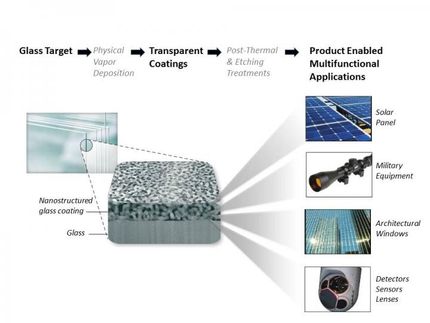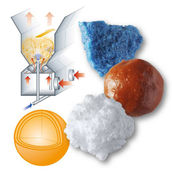Glass paint could keep metal roofs and other structures cool even on sunny days
Advertisement
Sunlight can be brutal. It wears down even the strongest structures, including rooftops and naval ships, and it heats up metal slides and bleachers until they're too hot to use. To fend off damage and heat from the sun's harsh rays, scientists have developed a new, environmentally friendly paint out of glass that bounces sunlight off metal surfaces.
"Most paints you use on your car or house are based on polymers, which degrade in the ultraviolet light rays of the sun," says Jason J. Benkoski, Ph.D. "So over time you'll have chalking and yellowing. Polymers also tend to give off volatile organic compounds, which can harm the environment. That's why I wanted to move away from traditional polymer coatings to inorganic glass ones."
Glass would be an ideal coating. It's hard, durable and has the right optical properties. But it's very brittle.
To address that aspect in a new coating, Benkoski, who is at the Johns Hopkins University Applied Physics Lab, started with silica, one of the most abundant materials in the earth's crust. He modified one version of it, potassium silicate, that normally dissolves in water. His tweaks transformed the compound so that when it's sprayed onto a surface and dries, it becomes water resistant.
Unlike other paints, Benkoski's paint is almost completely inorganic, which should make it last far longer than its counterparts that contain organic compounds. His paint is also designed to expand and contract with metal surfaces to prevent cracking.
Mixing pigments with the silicate gives the coating an additional property: the ability to reflect all sunlight and passively radiate heat. Since it doesn't absorb sunlight, any surface coated with the paint will remain at air temperature, or even slightly cooler. That's key to protecting structures from the sun.
Other news from the department science
These products might interest you

Get the chemical industry in your inbox
By submitting this form you agree that LUMITOS AG will send you the newsletter(s) selected above by email. Your data will not be passed on to third parties. Your data will be stored and processed in accordance with our data protection regulations. LUMITOS may contact you by email for the purpose of advertising or market and opinion surveys. You can revoke your consent at any time without giving reasons to LUMITOS AG, Ernst-Augustin-Str. 2, 12489 Berlin, Germany or by e-mail at revoke@lumitos.com with effect for the future. In addition, each email contains a link to unsubscribe from the corresponding newsletter.





























































